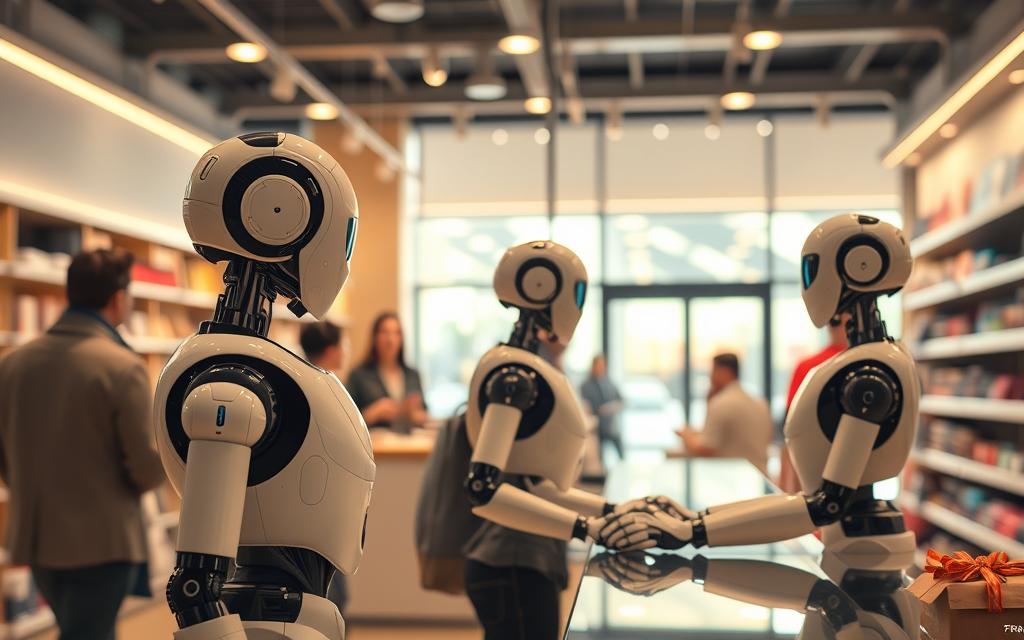Chatbots have become a vital tool for businesses across various sectors. From healthcare to retail, these intelligent systems streamline operations and enhance customer experiences. For instance, Domino’s integration with Messenger has increased conversations by 55%, showcasing their efficiency.
Customers increasingly prefer self-service options, with 66% favoring interactions via these automated assistants. Companies like PVR Cinemas have leveraged chatbots to boost ticket sales by integrating trailer previews into their platforms.
In the events industry, Slush relies on these tools to handle 64% of customer support requests. Similarly, Seattle Ballooning’s conversational assistant generates 18% more qualified leads. These examples highlight the versatility and impact of chatbots in modern business strategies.
Introduction to Chatbots
Artificial intelligence has revolutionized how businesses interact with customers. One of the most impactful innovations is the development of conversational assistants powered by AI and natural language processing (NLP). These tools are designed to handle tasks like order processing, answering queries, and providing instant support.
What Are Chatbots?
Chatbots are intelligent systems that simulate human conversation. They combine artificial intelligence and NLP to understand and respond to user inputs. From ELIZA in 1966 to GPT-4-powered assistants today, these tools have evolved significantly. They now handle complex tasks, making them indispensable for businesses.
Why Are Chatbots Important?
One of the key advantages of chatbots is their 24/7 availability. Research shows they reduce customer wait times by 82%, ensuring instant responses. For example, Freshchat helped Klarna cut response times to just 60 seconds. This efficiency enhances the customer experience and builds trust.
Chatbots also save costs by automating repetitive tasks. HOAS, a housing company, found that 59% of queries were resolved without human intervention. Additionally, 68% of users report higher satisfaction when interacting with conversational interfaces. This emotional impact makes them a valuable asset for businesses.
Chatbots in Customer Service
Customer service has transformed with the integration of intelligent conversational tools. These systems streamline operations, reduce costs, and improve user satisfaction. From handling frequently asked questions to providing round-the-clock assistance, they are reshaping how businesses interact with their clients.
Handling Frequently Asked Questions
One of the primary roles of these tools is to address common questions. For instance, Zalando’s conversational assistant manages 70% of order tracking requests. This frees up the support team to focus on more complex issues.
Sephora’s virtual assistant has reduced email tickets by 41%, showcasing its efficiency. By categorizing FAQs using platforms like IBM Watson, businesses can ensure quick and accurate responses. This approach not only saves time but also enhances the customer support experience.
“Automating FAQs allows companies to scale their support operations without compromising quality.”
Providing 24/7 Support
Round-the-clock availability is another key advantage. Bank of America’s Erica handles over 50 million client requests annually, ensuring users get instant assistance. Similarly, Amtrak’s Julie bot maintained seamless service during peak travel periods, demonstrating its reliability in crisis management.
Financially, these tools are cost-effective. A live agent call costs $8.70, while a conversational interaction averages just $0.90. This makes them an ideal solution for businesses aiming to optimize their customer support budgets.
| Metric | Live Agent | Chatbot |
|---|---|---|
| Cost per Interaction | $8.70 | $0.90 |
| Response Time | Minutes to Hours | Seconds |
| Availability | Limited Hours | 24/7 |
These examples highlight how conversational tools chatbots help businesses deliver efficient and reliable support. By automating repetitive tasks, they ensure that users receive timely and accurate chatbots answer to their queries.
Chatbots in E-commerce
E-commerce platforms are leveraging intelligent systems to enhance user experiences and drive sales. These tools help businesses engage with customers more effectively, offering personalized solutions and streamlining operations. From product recommendations to order tracking, they play a crucial role in modern online retail.

Product Recommendations
Personalized suggestions are a game-changer for e-commerce. Intelligent systems analyze user behavior to recommend relevant products. For example, Apliiq’s fashion assistant increased sales by 27% through tailored suggestions. Similarly, ASOS’ Style Match drives 35% of mobile conversions by matching user preferences with available items.
These tools also reduce returns. Nike’s sizing assistant uses machine learning to ensure accurate fits, cutting return rates by 38%. By offering the right product at the right time, businesses can boost customer satisfaction and loyalty.
Order Tracking and Returns
Post-purchase processes are simplified with conversational tools. Customers can track orders and initiate returns effortlessly. Zalando’s assistant handles 63% of return requests, ensuring a seamless experience. This not only saves time but also enhances trust in the website.
Abandoned cart recovery is another area where these tools excel. Platforms like Octane AI help Shopify stores recover lost sales, boosting revenue by 11%. By addressing visitor concerns in real-time, businesses can turn potential losses into conversions.
- IKEA’s interior design assistant increases average order value by $47.
- Shopify stores using Octane AI see 14% higher repeat purchase rates.
Chatbots in Healthcare
Healthcare is embracing intelligent systems to improve patient care. These tools streamline processes, reduce wait times, and enhance overall service quality. From scheduling appointments to managing patient support, they are transforming the industry.
Appointment Scheduling
Efficient scheduling is critical in healthcare. Intelligent systems like Babylon Health handle 4.2 million UK appointments annually, ensuring patients get timely care. Sensely’s AI nurse reduces no-shows by 22%, improving clinic efficiency.
These tools also save time for both patients and providers. By automating booking and reminders, they minimize administrative burdens and focus on delivering quality care.
Patient Support and Reminders
Patient engagement is key to better outcomes. Intelligent systems provide personalized information and reminders, ensuring adherence to treatment plans. For example, MyMedsReminder cuts missed doses by 63%, improving medication compliance.
Mental health support is another area where these tools excel. Woebot, an AI-powered assistant, reduces anxiety scores by 19% in clinical trials. This highlights their potential to address diverse healthcare needs.
“AI-driven solutions are not just tools; they are partners in delivering better patient outcomes.”
- Mayo Clinic’s symptom checker improves triage accuracy by 41%.
- Pfizer’s vaccine assistant managed over 12 million patient interactions.
- HIPAA-compliant implementations using Salesforce Health Cloud ensure data security.
Chatbots in Banking and Finance
The banking and finance sector is rapidly adopting advanced technologies to enhance efficiency and security. Intelligent systems are now integral to delivering seamless services and protecting sensitive data. From account management to fraud detection, these tools are transforming how financial institutions operate.

Account Management
Intelligent systems simplify account management for clients. DBS Bank’s digibot processes loans 80% faster, ensuring quick approvals. Chase’s COIN reviews 12,000 contracts in seconds, saving 360,000 human hours. These tools not only save time but also improve accuracy and customer satisfaction.
Santander’s SmartBank app achieves 92% customer satisfaction by offering personalized financial insights. Betterment’s robo-advisor manages $45 billion in assets, providing tailored investment strategies. These examples highlight how artificial intelligence is reshaping financial services.
Fraud Detection and Prevention
Fraud prevention is a critical area where intelligent systems excel. Capital One’s Eno prevents $140 million in annual fraud by analyzing transaction patterns. Mastercard’s KAI reduces chargeback processing time by 78%, ensuring faster resolutions.
Blockchain integration further enhances security. HSBC’s FX bot settles trades in just 3 seconds, minimizing risks. These advancements demonstrate how chatbots used in banking are safeguarding financial systems and building trust.
“AI-driven fraud detection is not just a tool; it’s a necessity in today’s digital banking landscape.”
- Chase’s COIN reviews 12,000 contracts in seconds vs 360k human hours.
- Mastercard’s KAI reduces chargeback processing time by 78%.
- Betterment’s robo-advisor manages $45 billion in assets.
- Santander’s SmartBank app achieves 92% customer satisfaction.
- HSBC’s FX bot settles trades in 3 seconds using blockchain.
Chatbots in Education
The education sector is leveraging intelligent systems to enhance learning and administrative efficiency. These tools provide personalized support to users and streamline repetitive tasks, allowing educators to focus on delivering quality instruction.

Student Support and Tutoring
Intelligent systems are transforming how students receive help. Georgia State’s Pounce reduced summer melt by 22%, ensuring more students transition smoothly into college. Duolingo’s bots improve language retention by 31%, making learning more effective.
Plaito’s homework helper increases test scores by 14 percentile points, showcasing its impact on academic performance. Coursera’s Course Assistant handles 2.3 million monthly learner queries, providing instant access to information.
Administrative Assistance
Educational institutions are also using these tools to manage operations. Arizona State processes 73% of transcripts via automation, saving time for the team. Watermark’s bot ensures 100% compliance with accreditation standards, reducing manual effort.
Rave Guardian’s emergency bot cuts response times, enhancing campus safety. These examples highlight the way intelligent systems are reshaping education, from student support to administrative efficiency.
- Coursera’s Course Assistant handles 2.3M monthly learner queries.
- Administrative automation: Arizona State processes 73% of transcripts via bot.
- Plaito’s homework helper increases test scores by 14 percentile points.
- Campus safety: Rave Guardian’s emergency bot reduces response times.
- Accreditation tracking: Watermark’s chatbot ensures 100% compliance.
Chatbots in Travel and Hospitality
The travel and hospitality industry is increasingly adopting intelligent systems to enhance customer interactions and streamline operations. These tools are transforming how businesses manage bookings, handle queries, and gather feedback, ensuring a seamless experience for travelers.

Booking and Reservations
Intelligent systems simplify the booking process, making it faster and more efficient. KLM’s BlueBot handles 1.6 million annual messages, ensuring travelers get instant assistance. Hilton’s Connie increases upsell revenue by 17%, showcasing the potential of these tools to drive sales.
Marriott’s chat concierge books 28% of reward nights, highlighting its effectiveness in managing reservations. AirAsia’s AVA reduces call center volume by 39%, freeing up resources for more complex tasks. These examples demonstrate how intelligent systems are reshaping the booking landscape.
Customer Feedback and Surveys
Gathering feedback is crucial for improving service. Post-stay surveys via bot achieve a 53% response rate, according to Medallia. This high engagement ensures businesses receive valuable insights to enhance the customer experience.
Dynamic pricing is another area where these tools excel. Hopper’s AI predicts fare changes with 95% accuracy, helping travelers make informed decisions. During crises, Expedia’s bot rebooks 650,000 flights, ensuring minimal disruption for travelers.
| Feature | Benefit |
|---|---|
| Booking Automation | Reduces manual effort and speeds up reservations |
| Dynamic Pricing | Helps travelers find the best deals |
| Crisis Management | Ensures seamless rebooking during disruptions |
These advancements highlight the versatility of intelligent systems in the travel and hospitality sector. By automating repetitive tasks and providing personalized support, they ensure a smoother and more enjoyable experience for travelers.
Chatbots in Real Estate
The real estate industry is harnessing the power of intelligent systems to streamline operations and enhance client interactions. These tools are transforming how properties are marketed, tours are conducted, and leads are managed, ensuring a seamless experience for both agents and buyers.

Property Listings and Virtual Tours
Intelligent systems are revolutionizing property marketing. Zillow’s 3D Home tours increase engagement by 41%, allowing potential buyers to explore listings remotely. Virtual staging platforms like Matterport boost listing views by 67%, making properties more appealing.
Compass’ AI assistant books 22% more showings, ensuring agents maximize their time. These tools not only save effort but also attract more qualified clients, enhancing the overall business process.
Lead Generation and Qualification
Generating and qualifying leads is a critical aspect of real estate. RE/MAX’s system qualifies 38% more leads, ensuring agents focus on high-potential clients. BoomTown’s bot increases conversion rates by 29%, showcasing its effectiveness in lead scoring.
Automation also simplifies contract reviews. Luminance reduces legal review time by 85%, speeding up transactions. AppFolio automates 91% of rent collections, ensuring smoother operations for property managers.
| Feature | Benefit |
|---|---|
| Virtual Tours | Increases engagement by 41% |
| Lead Qualification | Boosts qualified leads by 38% |
| Rent Collection | Automates 91% of payments |
These advancements highlight how intelligent systems are reshaping real estate. By automating repetitive tasks and providing personalized solutions, they ensure a smoother and more efficient experience for all parties involved.
Chatbots in Retail
Retailers are leveraging advanced technologies to redefine customer interactions. Intelligent systems are now a cornerstone of modern retail strategies, enhancing both operational efficiency and the shopping experience. From personalized recommendations to streamlined inventory management, these tools are reshaping the industry.

Personalized Shopping Experience
One of the most significant impacts of intelligent systems in retail is the ability to offer personalized shopping experiences. For instance, H&M’s conversational assistant increases basket size by 28% by suggesting tailored products. Sephora’s Color Match drives 11% more foundation sales by helping customers find the perfect shade.
Augmented reality (AR) is also enhancing the shopping journey. IKEA Place increases conversion rates by 14% by allowing users to visualize furniture in their homes. These innovations not only boost sales but also create a more engaging and satisfying experience for customers.
Inventory Management
Efficient inventory management is another area where intelligent systems excel. Lowe’s LoweBot manages over 30,000 SKUs, ensuring shelves are stocked and products are easily accessible. Walmart’s inventory bot reduces out-of-stocks by 35%, minimizing lost sales opportunities.
Curbside pickup and voice commerce are also gaining traction. Best Buy’s conversational tool handles 43% of curbside orders, while Albertsons’ voice orders via Alexa have grown by 320%. These advancements highlight how retailers are using technology to meet evolving customer demands.
- H&M’s assistant increases basket size by 28%.
- Sephora’s Color Match boosts foundation sales by 11%.
- Walmart’s bot reduces out-of-stocks by 35%.
- Best Buy handles 43% of curbside orders via chatbot.
- Albertsons’ voice orders grow 320% via Alexa.
Chatbots in Telecommunications
Telecommunications companies are embracing advanced technologies to improve customer interactions. Intelligent systems are now a key part of their strategy, helping to resolve issues faster and enhance overall service quality. From troubleshooting network problems to sending timely updates, these tools are transforming the telecom landscape.

Customer Support and Troubleshooting
One of the primary uses of intelligent systems in telecom is to provide efficient support. Verizon’s conversational assistant resolves 82% of network issues without human intervention. This ensures that customers get quick solutions to their problems, reducing frustration and improving satisfaction.
T-Mobile’s bot has reduced truck rolls by 27%, saving time and resources. AT&T’s mobile support tool decreases store visits by 31%, allowing users to resolve queries from the comfort of their homes. These examples highlight how automation is streamlining support operations in the telecom sector.
Service Updates and Notifications
Proactive communication is another area where these tools excel. Proactive outage alerts via bot improve Net Promoter Scores (NPS) by 19 points, ensuring customers stay informed. Comcast automates 73% of equipment return processes, making it easier for users to manage their accounts.
During the 5G rollout, Ericsson’s conversational assistant trained 12,000 technicians, ensuring a smooth transition. Vodafone’s TOBi saves 650,000 annual calls by handling account management tasks efficiently. These advancements demonstrate the versatility of intelligent systems in telecom.
| Feature | Benefit |
|---|---|
| Network Issue Resolution | Verizon’s bot resolves 82% of issues |
| Reduced Truck Rolls | T-Mobile cuts truck rolls by 27% |
| Proactive Alerts | Improves NPS by 19 points |
| Account Management | Vodafone’s TOBi saves 650k calls annually |
These examples show how intelligent systems are reshaping telecommunications. By automating repetitive tasks and providing instant information, they ensure a smoother and more efficient experience for users.
Chatbots in Government Services
Government agencies are increasingly adopting intelligent systems to improve public interactions. These tools streamline processes, reduce wait times, and enhance the overall quality of services. From answering citizen queries to automating form submissions, they are transforming how governments operate.
Public Information and Support
One of the primary roles of these systems is to provide accurate and timely information to citizens. For example, the UK’s GOV.UK Notify sends over 300 million automated messages annually, ensuring users stay informed. Similarly, Singapore’s Ask Jamie handles 4.1 million queries, showcasing its efficiency in addressing public concerns.
In the U.S., the IRS resolves 82% of tax-related questions without human intervention. This not only saves time but also ensures that people receive instant answers to their queries. Emergency alerts are another critical area, with FEMA’s system reaching 92% of at-risk populations during crises.
Form Submission and Processing
Intelligent systems are also revolutionizing how governments handle paperwork. Estonia’s e-Residency bot cuts visa approval times significantly, ensuring a smoother process for applicants. In California, CalFresh automates 68% of benefits applications, reducing administrative burdens and speeding up assistance for those in need.
New York City’s parking permit bot processes 41,000 monthly requests, ensuring a seamless experience for residents. These examples highlight the way intelligent systems are simplifying complex tasks and improving efficiency in government operations.
| Feature | Benefit |
|---|---|
| Automated Messaging | GOV.UK Notify sends 300M+ messages annually |
| Query Resolution | IRS chatbot resolves 82% of tax queries |
| Emergency Alerts | FEMA’s bot reaches 92% at-risk populations |
| Form Automation | CalFresh automates 68% of applications |
These advancements demonstrate how intelligent systems are reshaping government services. By automating repetitive tasks and providing instant support, they ensure a smoother and more efficient experience for citizens.
Chatbots in Manufacturing
Manufacturing is undergoing a digital transformation with the help of intelligent systems. These tools are streamlining operations, reducing costs, and improving efficiency across the sector. From supply chain management to maintenance, they are reshaping how businesses handle complex processes.
Supply Chain Management
Intelligent systems are optimizing supply chains by automating repetitive tasks. For example, Caterpillar automates 73% of purchase order processes, ensuring faster and more accurate transactions. GE’s Predix handles $1.2 billion in parts orders, showcasing its ability to manage large-scale operations.
Inventory management is another area where these tools excel. John Deere saves $47 million annually by optimizing stock levels. This not only reduces waste but also ensures that the team has the resources they need to meet production demands.
Maintenance and Repairs
Predictive maintenance is a game-changer for manufacturers. Bosch’s system prevents 17% of equipment failures by analyzing data in real-time. Siemens’ conversational assistant reduces equipment downtime by 29%, ensuring minimal disruptions to production schedules.
Safety and quality control are also enhanced with these tools. 3M’s system reduces workplace incidents by 22%, while Toyota’s bot detects 93% of defects before shipment. These advancements highlight how intelligent systems are improving both efficiency and safety in manufacturing.
“Automation in manufacturing isn’t just about efficiency; it’s about creating smarter, safer, and more sustainable operations.”
- Predictive maintenance: Bosch’s bot prevents 17% failures.
- Supplier management: Caterpillar automates 73% of PO processes.
- Safety compliance: 3M’s chatbot reduces incidents by 22%.
- Inventory optimization: John Deere saves $47M annually.
- Quality control: Toyota’s bot detects 93% of defects pre-shipment.
Chatbots in Marketing
Marketing strategies are evolving with the integration of intelligent systems, offering new ways to connect with audiences. These tools are transforming how businesses generate leads, manage campaigns, and enhance engagement. By automating repetitive tasks, they allow marketers to focus on creativity and strategy.
Lead Generation and Qualification
Intelligent systems are revolutionizing lead generation. Drift’s conversational assistant increases lead conversion by 31%, ensuring businesses capture high-quality prospects. Marketo’s progressive profiling boosts MQLs by 27%, helping companies target the right audience.
Account-based marketing (ABM) strategies are also benefiting. Terminus’ tool engages 89% of target accounts, ensuring personalized outreach. These advancements highlight how automation is reshaping the way businesses qualify and nurture leads.
Campaign Management
Campaign management is becoming more efficient with intelligent systems. HubSpot’s bot manages over 220,000 campaigns, ensuring seamless execution. Splash’s conversational assistant increases event registration by 33%, showcasing its ability to drive engagement.
Content distribution is another area where these tools excel. BuzzFeed’s bot shares 1.2 million articles daily, ensuring widespread reach. Salesforce’s Einstein measures a 47% lift in campaign ROI, providing valuable insights for marketers.
“Automation in marketing isn’t just about efficiency; it’s about creating smarter, more impactful campaigns.”
- Progressive profiling: Marketo boosts MQLs by 27%
- ABM strategies: Terminus’ chatbot engages 89% target accounts
- Event promotion: Splash’s bot increases registration by 33%
- Content distribution: BuzzFeed’s chatbot shares 1.2M articles daily
- ROI tracking: Salesforce’s Einstein measures 47% lift in campaigns
Chatbots in Social Media
Social media platforms are leveraging intelligent systems to boost user engagement. These tools are transforming how brands interact with their audience, offering personalized experiences and streamlining communication. From viral campaigns to crisis management, intelligent systems are reshaping social media strategies.
Engagement and Interaction
Intelligent systems are enhancing how brands connect with their users. Netflix’s Twitter bot increases watch time by 18%, ensuring viewers stay engaged. Wendy’s #RoastMe campaign garnered 2.8 million interactions, showcasing the power of creative engagement.
Instagram shopping is another area where these tools excel. Sephora’s bot drives 11% of social sales by offering personalized product recommendations. Viral campaigns like Coca-Cola’s Happiness Machine generate 25 million shares, amplifying brand reach.
Customer Feedback and Surveys
Gathering feedback is crucial for improving customer experiences. Airbnb’s bot handled 89% of COVID-related cancellations, ensuring seamless communication during crises. Hootsuite’s sentiment analysis tracks 1.4 million brand mentions, providing valuable insights for marketers.
Influencer matching is another innovative application. AspireIQ’s tool pairs 38,000 creators with brands, ensuring authentic collaborations. These advancements highlight how intelligent systems are transforming social media interactions.
| Feature | Benefit |
|---|---|
| Viral Campaigns | Coca-Cola’s Happiness Machine generates 25M shares |
| Crisis Response | Airbnb’s bot handles 89% of cancellations |
| Sentiment Analysis | Hootsuite tracks 1.4M brand mentions |
| Influencer Matching | AspireIQ pairs 38k creators with brands |
Chatbots in Internal Business Operations
Intelligent systems are reshaping internal business operations, offering innovative solutions for employee support and communication. These tools streamline repetitive tasks, enhance efficiency, and improve overall productivity within organizations.
From onboarding to compliance training, these systems are transforming how businesses operate internally. For example, Accenture’s HR bot answers 81% of employee queries, ensuring quick resolutions. Unilever’s conversational assistant trains 150,000 staff members, showcasing its scalability.
Employee Support and Training
Onboarding new hires is faster and more efficient with intelligent systems. IBM’s Watson reduces ramp time by 33%, helping new employees integrate seamlessly. IT support is also streamlined, with ServiceNow resolving 65% of tickets automatically.
Compliance training is another area where these tools excel. SAP’s conversational assistant completes 92% of certifications, ensuring regulatory adherence. This not only saves time but also ensures consistency across the team.
Internal Communication and Announcements
Meeting scheduling is simplified with tools like X.ai, saving executives 4 hours weekly. Knowledge sharing is enhanced through Microsoft’s Teams bot, which surfaces 73% of relevant documents. This ensures that people have access to the information they need, when they need it.
These advancements highlight the way intelligent systems are improving internal operations. By automating repetitive tasks and providing instant support, they ensure a smoother and more efficient workflow.
| Feature | Benefit |
|---|---|
| Onboarding | IBM’s Watson reduces ramp time by 33% |
| IT Support | ServiceNow resolves 65% of tickets automatically |
| Compliance Training | SAP’s bot completes 92% of certifications |
| Meeting Scheduling | X.ai saves executives 4 hours weekly |
| Knowledge Sharing | Microsoft’s Teams bot surfaces 73% of documents |
Where Is Chatbot Used in Emerging Industries?
Emerging industries are rapidly adopting advanced technologies to redefine their operations. From the metaverse to quantum computing, intelligent systems are driving innovation and efficiency. These tools are not just enhancing business processes but also creating new opportunities for growth and development.
AI and Machine Learning Integration
The integration of artificial intelligence and machine learning is transforming how emerging industries operate. For instance, NVIDIA’s Omniverse uses AI to train 3D avatars for metaverse applications. IBM’s Qiskit assists researchers in quantum computing, showcasing the potential of these technologies.
Blockchain is another area where intelligent systems are making an impact. Chainalysis’ conversational tool tracks over $1 trillion in cryptocurrency transactions, ensuring transparency and security. These advancements highlight the versatility of AI-driven solutions in cutting-edge sectors.
Future Trends and Innovations
The future trends in intelligent systems are shaping the next wave of innovation. Voice cloning technologies, like Resemble AI, achieve 99% human likeness, opening new possibilities for communication. Predictive analytics tools, such as Palantir’s bot, forecast supply chain risks, helping businesses stay ahead of challenges.
According to Gartner, 85% of customer interactions will be managed by intelligent systems by 2025. ChatGPT already handles 25 million daily queries, demonstrating the growing reliance on these tools. These trends underscore the transformative potential of services powered by AI and machine learning.
“The integration of AI in emerging industries isn’t just about efficiency; it’s about creating smarter, more innovative solutions for the future.”
- Metaverse applications: NVIDIA’s Omniverse trains 3D avatars.
- Quantum computing: IBM’s Qiskit chatbot assists researchers.
- Blockchain integration: Chainalysis’ bot tracks $1T crypto.
- Voice cloning: Resemble AI achieves 99% human likeness.
- Predictive analytics: Palantir’s bot forecasts supply chain risks.
Conclusion
Intelligent conversational tools are reshaping industries by driving efficiency and enhancing interactions. Across 53 chatbot use cases, these systems save 2.5 billion service hours annually, enabling businesses to focus on strategic growth. With an average ROI of 320%, enterprises report significant returns within 12 months of implementation.
Emerging trends like emotional AI and holographic interfaces are pushing boundaries, offering deeper personalization and immersive customer experience. For cross-departmental deployment, start with a clear strategy, integrate existing systems, and train teams for seamless adoption.
Ready to transform your operations? Assess your digital readiness today and unlock the potential of intelligent systems to save time and boost productivity.
FAQ
What industries benefit most from chatbots?
Chatbots are widely used in customer service, e-commerce, healthcare, banking, education, travel, real estate, retail, telecommunications, government services, manufacturing, marketing, social media, and internal business operations.
How do chatbots improve customer service?
They handle frequently asked questions, provide 24/7 support, and enhance the overall customer experience by resolving queries quickly and efficiently.
Can chatbots assist in e-commerce?
Yes, they offer product recommendations, help with order tracking, and manage returns, making the shopping experience seamless for customers.
What role do chatbots play in healthcare?
They assist with appointment scheduling, provide patient support, and send reminders for medications or follow-ups, improving healthcare accessibility.
How are chatbots used in banking and finance?
They manage account inquiries, detect fraudulent activities, and provide financial advice, ensuring secure and efficient banking services.
Do chatbots support education?
Absolutely. They offer student support, tutoring, and administrative assistance, streamlining educational processes for institutions and learners.
What functions do chatbots perform in travel and hospitality?
They handle bookings, reservations, and gather customer feedback, enhancing the travel experience and improving service quality.
How do chatbots benefit real estate?
They showcase property listings, provide virtual tours, and generate qualified leads, making property searches more efficient for buyers and agents.
Can chatbots enhance retail experiences?
Yes, they personalize shopping experiences, manage inventory, and assist with product searches, boosting customer satisfaction and sales.
What advantages do chatbots offer in telecommunications?
They provide customer support, troubleshoot issues, and send service updates, ensuring smooth communication for users.
How are chatbots utilized in government services?
They offer public information, assist with form submissions, and streamline processing, improving accessibility and efficiency for citizens.
What role do chatbots play in manufacturing?
They manage supply chains, assist with maintenance, and handle repairs, optimizing operational efficiency in the manufacturing sector.
How do chatbots support marketing efforts?
They generate leads, qualify prospects, and manage campaigns, helping businesses reach their target audience effectively.
Can chatbots improve social media engagement?
Yes, they interact with users, gather feedback, and conduct surveys, enhancing brand engagement and customer insights.
How do chatbots streamline internal business operations?
They provide employee support, assist with training, and facilitate internal communication, boosting productivity and collaboration.
What are emerging uses for chatbots?
Chatbots are integrating AI and machine learning for advanced applications, paving the way for future innovations across industries.











